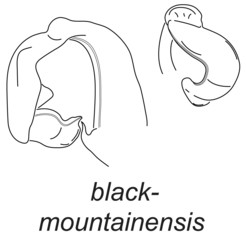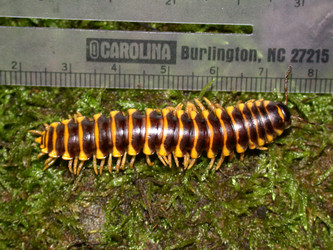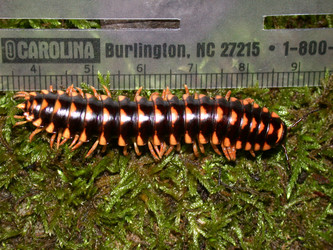Brachoria blackmountainensis
The Black Mountain Mimic Millipede
Paul MarekCharacteristics
Brachoria blackmountainensis individuals are about 44.1 mm long and 9.8 mm wide (females 44.8 mm X 10.6 mm). Color: Striped pink (8.75R 6/12, shown above) or yellow (1.25Y 7/14); and 3-spotted pink (3.75YR 7/12, shown above).


Brachoria blackmountainensis genitalia - left male gonopodal acropodite (with setae removed): (Left) medial view and (Right) magnified apical view. © Paul Marek


Brachoria blackmountainensis, striped yellow (1.25Y 7/14) color morph. © Paul Marek
Habitat
Brachoria blackmountainensis specimens were collected during the evening (16:39, Trace Branch) in a forest predominately comprising maple trees. Individuals were found beneath layers of accumulated decomposing leaf material adjacent to KY-160. On the summit of Black Mountain, the highest peak in Kentucky, specimens were collected during the evening (19:00) beneath decomposing leaves in a high elevation mixed mesophytic forest comprising oak and maple trees. Brachoria blackmountainensis occurs at the highest elevation of any other species of Brachoria from 727 – 1254.5 m. No other xystodesmids were encountered sympatrically at this locality. Note: Individuals of B. blackmountainensis may be confused in the field with Apheloria virginiensis corrugata and Cherokia georgiana latassa due to similarity in color patterns and overlap in distribution.Distribution
Known only from the type locality on Black Mountain in Harlan Co., Kentucky. The closest known Brachoria species, B. hoffmani, occurs about 12 air km east near Halfway Branch, Wise County, Virginia.Conservation status
Brachoria blackmountainensis is threatened by habitat loss due to agriculture (especially growing demand for paper products), coal mining, development, and the invasion of exotic species.References
Marek P.E. 2010. A revision of the Appalachian millipede genus Brachoria Chamberlin, 1939 (Polydesmida: Xystodesmidae: Apheloriini). Zool. J. Linn. Soc. 159: 817-889.
Title Illustrations

| Scientific Name | Brachoria blackmountainensis |
|---|---|
| Location | USA, Kentucky, Harlan Co. |
| Reference | Marek P.E. 2010. A revision of the Appalachian millipede genus Brachoria Chamberlin, 1939 (Polydesmida: Xystodesmidae: Apheloriini). Zool. J. Linn. Soc. 159: 817-889. |
| Specimen Condition | Live Specimen |
| Sex | m |
| Life Cycle Stage | adult |
| View | dorsal |
| Collection | FMNH |
| Collector | Paul Marek |
| Image Use |
 This media file is licensed under the Creative Commons Attribution-NonCommercial License - Version 3.0. This media file is licensed under the Creative Commons Attribution-NonCommercial License - Version 3.0.
|
| Copyright |
© Paul Marek

|
| Scientific Name | Brachoria blackmountainensis |
|---|---|
| Location | USA, Kentucky, Harlan Co. |
| Reference | Marek P.E. 2010. A revision of the Appalachian millipede genus Brachoria Chamberlin, 1939 (Polydesmida: Xystodesmidae: Apheloriini). Zool. J. Linn. Soc. 159: 817-889. |
| Specimen Condition | Live Specimen |
| Sex | m |
| Life Cycle Stage | adult |
| View | dorsal |
| Collection | FMNH |
| Type | holotype |
| Collector | Paul Marek |
| Image Use |
 This media file is licensed under the Creative Commons Attribution-NonCommercial License - Version 3.0. This media file is licensed under the Creative Commons Attribution-NonCommercial License - Version 3.0.
|
| Copyright |
© Paul Marek

|
About This Page
Work on the millipede Tree of Life pages was supported by a U.S. National Science Foundation Doctoral Dissertation Improvement Grant to Paul Marek and Jason Bond (DEB 0607996) and a Partnerships for Enhancing Expertise in Taxonomy Grant to Petra Sierwald, Jason Bond, and William Shear (DEB 0529715).
Paul Marek

Virginia Polytechnic Institute and State University
Correspondence regarding this page should be directed to Paul Marek at
brachoria@gmail.com
Page copyright © 2010 Paul Marek
 Page: Tree of Life
Brachoria blackmountainensis . The Black Mountain Mimic Millipede.
Authored by
Paul Marek.
The TEXT of this page is licensed under the
Creative Commons Attribution-NonCommercial License - Version 3.0. Note that images and other media
featured on this page are each governed by their own license, and they may or may not be available
for reuse. Click on an image or a media link to access the media data window, which provides the
relevant licensing information. For the general terms and conditions of ToL material reuse and
redistribution, please see the Tree of Life Copyright
Policies.
Page: Tree of Life
Brachoria blackmountainensis . The Black Mountain Mimic Millipede.
Authored by
Paul Marek.
The TEXT of this page is licensed under the
Creative Commons Attribution-NonCommercial License - Version 3.0. Note that images and other media
featured on this page are each governed by their own license, and they may or may not be available
for reuse. Click on an image or a media link to access the media data window, which provides the
relevant licensing information. For the general terms and conditions of ToL material reuse and
redistribution, please see the Tree of Life Copyright
Policies.
- First online 16 September 2010
- Content changed 16 September 2010
Citing this page:
Marek, Paul. 2010. Brachoria blackmountainensis . The Black Mountain Mimic Millipede. Version 16 September 2010 (under construction). http://tolweb.org/Brachoria_blackmountainensis/144810/2010.09.16 in The Tree of Life Web Project, http://tolweb.org/








 Go to quick links
Go to quick search
Go to navigation for this section of the ToL site
Go to detailed links for the ToL site
Go to quick links
Go to quick search
Go to navigation for this section of the ToL site
Go to detailed links for the ToL site